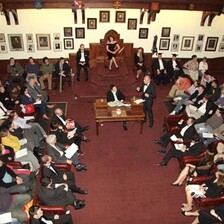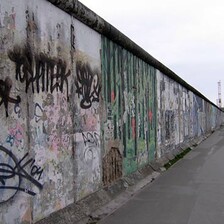The Electronic Intifada 21 October 2004

An elaborate network of translators, volunteers from all over Europe, sat in little boxes translating the cries against imperialism, capitalism, colonialism and occupation into English, French, Spanish and German. Headphones were free of charge and a travel card was included with the price of the ticket. Food and beverages were provided at extra cost. There was a heavy demand for Arabic language speakers.
In the Great Hall, Cubans sold Che Guevara books, badges and mugs. Communists distributed Marxist literature. Palestinians sold olive oil. Persians protested the Ayatollahs. Feminists campaigned for women’s rights, greens for the environment and Iraqis for Iraq. Activists drew attention to the plight of political prisoners throughout the world, and artists protested against the war. “It’s not who you are against but what you’re for” declared one banner.
On the first day of the forum, in a show of solidarity and cooperation, Palestinians and Israelis universally condemned the government of Ariel Sharon. “I am calling for international sanctions on the Israeli regime” shouted Jonathan Shapira, a former helicopter pilot turned refusenik to rapturous applause. “Sharon must be put in Jail” thundered Mustafa Barghouti of Medical Relief for Palestine.
Towards the end of the talk, a young woman approached the microphone. “I am a Palestinian refugee from Chatila” she said. “When I was a child I had to walk over the bodies of my dead brothers and sisters. I have never seen Palestine” she lamented as the audience tried to hold back their tears. It was an emotional experience.
A young man then approached the stage from Jabaliya refugee camp where over a hundred Palestinians, including many civilians, were killed by the Israeli army in Gaza last week. “Jonathan is my hero” he said as he shook the hand of the former Israeli pilot who had admitted that “lately, I learnt how to say no.” Shapira was the first of twenty-six pilots in the Israeli air force to refuse “illegal and immoral orders.”
Palestine was so popular at the forum that people had to sit on the floor, or stand at the back during the plenary. Dennis Brutus, a poet, professor and former political prisoner who spent time on Robin Island with Nelson Mandela “breaking stones”, said it was “encouraging to see the crowds that have attended on each occasion to discuss the issue of the Palestinian people and their struggle for social justice.” He urged the audience to build a “global movement in support of the Palestinian people” just like was done in South Africa. “We can do this by boycotts, divestments, embargoes and sanctions” he said.
Ben Soffa, co-convener of “Jewish Students for Justice for Palestinians” was handing out leaflets at a seminar on Palestine. He told me there are “an awful lot of people” who sympathize with his organization even though they don’t always stand up and say so. In a recent poll, Soffa told me that “more British Jews say they are frequently critical of Israel than say that they are frequently supportive of the Israeli government.”
Primal Scream, a major British rock band, performed in Brixton Academy on Saturday evening in solidarity with the Palestinian people. The lead vocalist, Bobby Gillespie, wrote in the Guardian that “most people can see what is taking place on the ground in the Middle East. And they can see who needs our support. Everyone knows who is under the boot and who’s got the mouthful of broken glass. The Palestinians are a prisoner nation, refugees and exiles treated like ghosts. Now we want them to feel our solidarity.”
Jeremy Corbyn M.P. noted that Palestine is an icon across the whole continent, across the whole of the Middle East. “The injustice to the Palestinian people is seen as an injustice to the poor, to the downtrodden, to the oppressed and the marginalized throughout the world” he said. The rain over the weekend did not dampen expectations. Outside in the Marquee there was salsa music and a Palestinian rap group called DAM. “The Palestinians rappers were really good” a student informed me as we huddled together for shelter in the train station on our way home.
Related Links
Arab Media Watch Correspondent and committee member Victor Kattan is an ocassional contributor to the Electronic Intifada. Victor was a U.N. Development Program TOKTEN Consultant to the Badil Resource Center for Palestinian Residency and Refugee Rights from May-August 2003 and from November-February 2004. In July his article “The Right of Return Revisited” was published in a special edition of the Mediterannean Journal of Human Rights.





